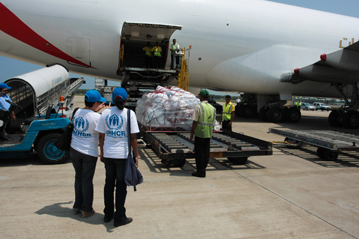Afghans thread their way through exile with new skills
Afghans thread their way through exile with new skills

MOHAMMAD KHEIL CAMP, Pakistan (UNHCR) - Life for any Afghan refugee is tough, but for a widow with five children, prospects can look bleak. Thankfully, Shafiqa has found new hope through a vocational training programme that specifically included women.
She recently received a certificate for completing her training in tailoring in a simple ceremony at Mohammad Kheil refugee camp - one of 800 refugees who have completed courses in building skills that will allow them to earn a living.
The six-month vocational training programme - two separate sections of three months each - was started in April 2003 by Rotary International Pakistan under an agreement with the UN High Commissioner for Refugees.
Under the programme, refugee men and women in the camp that hosts more than 45,000 Afghan refugees were trained in carpet weaving, embroidery by hand and by sewing machine, tailoring, welding and motorcycle repairs. The training was notable for involving some 300 women refugees.
"This training was special for women like me," said Shafiqa, adjusting her traditional blue Afghan burka. "I am a widow with three sons and two daughters. Our family mostly relies on the food distribution that is carried out by WFP [World Food Programme] and UNHCR in the camp. And that ration at times cannot meet our requirements."
Shafiqa said that in three months she had mastered tailoring ladies' and children's outfits and now - with the sewing machine that was given to her on completion of her training - she can make clothes to sell in the local village.
"The sewing machine will make life easier for me as now I will be able to make clothes in my own house," she added.
Shafiqa has already started reaping the rewards of her new skills. Some of the clothes she made during the training have already been bought by local villagers at Mohammad Kheil, bringing her valuable cash.

Jane Francis Naankayi, UNHCR's community services officer, said at the vocational training programme's closing ceremony that the refugee agency lacks funds for the many needs of refugees.
"UNHCR cannot provide everything to the refugees by itself. We requested Rotary International to help us train Afghan refugees in different skills," she said, hoping that the new skills would give refugees a chance to earn a living when they return to Afghanistan.
Colonel (Retired) N.D. Tanveer, a former Pakistan district governor of Rotary International, said the organisation has raised contributions from members all over the globe to help Afghan refugees in Pakistan.
"Rotarians in 166 countries have contributed to the Afghan refugee training and other programmes that were carried out in the camp. We hope that refugees, with our help, can start a better life in Afghanistan whenever they decide to return," he said.
Under a letter of understanding between UNHCR Pakistan and Rotary International, the latter adopted two Afghan refugee camps last year for assistance - Mohammad Kheil in Balochistan and Shalman camp in North-West Frontier Province, where the vocational training programme has trained another 800 Afghan refugees.
Rotary International also distributed food and other material assistance to the refugee population. At the end of the training programme, successful trainees received tool kits and sewing machines.
Exactly what will follow the current programme is unclear, as no decision has been made on future training. Ahmed Shah, an Afghan refugee elder from Mohammad Kheil camp, hopes that organisations like Rotary International will also emerge in the future to help UNHCR provide relief to Afghan refugees.
"These newly learnt skills will make us able to stand on our own feet," said Mohammad Jamil, of Kunduz province in Afghanistan, who has completed training in electric welding.
"Many refugees are reluctant to return because they still fear that there are no chances of employment in Afghanistan, but with these skills we can be self-sufficient."
By Babar Baloch
UNHCR Pakistan









